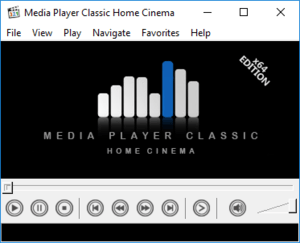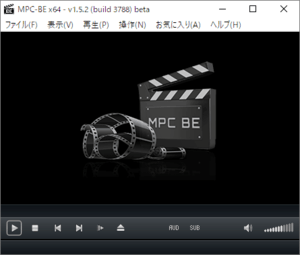Media Player Classic
Media Player Classic (MPC) is a compact media player for 32-bit and 64-bit Microsoft Windows. MPC mimics the look and feel of Windows Media Player 6.4, but provides most options and features available in modern media players. It and its forks are standard media players in the K-Lite Codec Pack and the Combined Community Codec Pack.
 | |
 Media Player Classic - Home Cinema version 1.7.10 running on Windows 10 | |
| Original author(s) | Gabest |
|---|---|
| Developer(s) | MPC-HC Community Forum |
| Initial release | May 30, 2003 |
| Stable release | 1.9.7 (unofficial)[1]
/ August 1, 2020 |
| Preview release | 1.9.7.22 (unofficial, x64 zip only)[1]
/ August 11, 2020 |
| Written in | C++ |
| Operating system | Windows |
| Platform | IA-32 and x86-64 |
| Size | IA-32: 14.2 MB x86-64: 15.3 MB |
| Available in | 42 languages[2] |
List of languages Arabic, Armenian, Basque, Belarusian, Bengali, Bosnian, Catalan, Chinese (Simplified), Chinese (Traditional), Croatian, Czech, Danish, Dutch, English, English (British), Finnish, French, Galician, German, Greek, Hebrew, Hungarian, Indonesian, Italian, Japanese, Korean, Lithuanian, Malay, Polish, Portuguese (Brazil), Punjabi, Romanian, Russian, Serbian, Slovak, Slovenian, Swedish, Spanish, Tatar, Thai, Turkish, Ukrainian, Vietnamese | |
| License | GNU General Public License |
| Website | MPC-HC official website (inactive) MPC-HC on GitHub (active fork by clsid2) |
This project is now principally maintained by the community at the Doom9 forum. The active forks are Home Cinema (MPC-HC) by clsid2, and Black Edition (MPC-BE) by aleksoid.
Development
Media Player Classic was created and maintained by a programmer named "Gabest" who also created PCSX2 graphics plugin GSDX. It was developed as a closed-source application, but later relicensed as free software under the terms of the GNU General Public License. MPC is hosted under the guliverkli project at SourceForge.net. The project itself is something of an umbrella organization for works by Gabest.
Media Player Classic development stalled in May 2006. Gabest, the main developer of the original version, stated in March 2007 that development of Media Player Classic is not dead but that he was unable to work on it.[3] The community at the Doom9 forum has since continued the project in two main veins. The version known as Media Player Classic 6.4.9.1 was meant for fixing bugs and updating outdated libraries; its branch's development is inactive.[4][5]
Home Cinema
A fork, called Media Player Classic - Home Cinema (MPC-HC), adds new features, as well as fixes bugs and updates libraries.[6]
MPC-HC updates the original player and adds many useful functionalities including the option to remove tearing, additional video decoders (in particular H.264, VC-1 and MPEG-2 with DirectX Video Acceleration support), Enhanced Video Renderer support, and multiple bug fixes. There is also a 64 bit-version of Media Player Classic - Home Cinema for the various Windows x64 platforms. MPC-HC requires at least Windows XP Service Pack 3.
As of version 1.4.2499.0, MPC-HC implemented color management support, an uncommon feature in video players at the time.[7] Windows 8 support was introduced in version 1.6.5.[8] Beginning with version 1.6.6 the stable releases are signed.[9]
Apart from stable releases as published, nightly builds are also publicly available.[10][11] MPC-HC is also distributed in the PortableApps format.[12] MPC-HC 1.7.8 released in 2015 was built with the MediaInfoLib 0.7.71.
MPC-HC 1.7.1 added support for HEVC format.
MPC-HC 1.7.13 now requires SSE2 supporting CPU and no longer runs on Intel Pentium III or AMD Athlon XP.
MPC-HC 1.7.13 is the final version and the program has been officially discontinued as of July 16, 2017, due to a shortage of active developers with C/C++ experience.[13] Its source code on GitHub was last updated on August 27, 2017, a month and a half after the official final version.[14].
Unofficial versions from the same developer responsible for MPC 6.4.9.1 started appearing in January 2018. These builds contain small fixes/improvements, updated internal codecs (LAV Filters), AV1 support, "youtube-dl" integration, and updates to some other external components;[15][16] support for Windows XP was also dropped in these builds.[15] Binary releases are available,[17] as well as source code.[18]
Black Edition
 Language setting is Japanese. | |
| Developer(s) | Alexander Vodiannikov |
|---|---|
| Initial release | September 12, 2012 |
| Stable release | 1.5.4.4969 [19]
/ December 27, 2019 |
| Preview release | 1.5.5.5274 [20]
/ May 8, 2020 |
| Written in | C++ |
| Operating system | Windows |
| Platform | x86-64 |
| Size | 14.0 MB |
| Available in | 26 languages |
List of languages English, Russian, Basque, Belarusian, Catalan, Chinese(Simplified), Chinese(Traditional), Czech, Dutch, English, French, German, Greek, Hebrew, Hungarian, Italian, Japanese, Korean, Polish, Portuguese(Brazil), Romanian, Slovak, Swedish, Spanish, Turkish, Ukrainian | |
| License | GNU GPL v3 |
| Website | mpc-be |
Media Player Classic - Black Edition (MPC-BE) is a fork of MPC and MPC-HC. It moved away from MPC's aim to mimic the look and feel of Windows Media Player with updated player controls and provides additional features on top of MPC-HC such as Seekbar Previews.[21]
Player development began in February 2011. Developers used a modification of MPC-HC made by a programmer nicknamed "bobdynlan".
The first version (1.0.1.0) was released on September 12, 2012.[19]
Starting with version 1.5.0, MPC-BE no longer supports Windows XP.[22]
MPC-BE version 1.5.1 and newer require SSE2 supporting CPU and no longer run on Intel Pentium III or AMD Athlon XP.[23]
MPC-BE stable release version 1.5.4.4969, was released December 27, 2019, and nightly builds are also available.[20][21]
Features
Media Player Classic is capable of VCD, SVCD, and DVD playback without installation of additional software or codecs. MPC has built-in codecs for MPEG-2 video with support for subtitles and codecs for LPCM, MP2, 3GP, AC3, and DTS audio. MPC also contains an improved MPEG splitter that supports playback of VCDs and SVCDs using its VCD/SVCD/XCD Reader. On October 30, 2005, Gabest added *.mp4 and MPEG-4 Timed Text support.[24] An AAC decoding filter had once been present in MPC. MPC-HC is also one of the first(unknown) to support Dolby Atmos audio natively. MPC can use an INI file in its application folder,[25] making it a portable application.
DirectShow
Media Player Classic is primarily based on the DirectShow architecture and therefore automatically uses installed DirectShow decoding filters. For instance, after the open source DirectShow decoding filter ffdshow has been installed, fast and high quality decoding and postprocessing of the MPEG-4 ASP, H.264, and Flash Video formats is available in MPC. MPC-HC can play videos in these formats directly without ffdshow.
MPC provides DXVA support for newer Intel, NVIDIA and ATI video cards when using an H.264 or VC-1 codec. This provides hardware-acceleration for playback.
In addition to DirectShow, MPC can also use the QuickTime, RealPlayer, and SHOUTcast codecs and filters (if installed on the computer) to play their native files.[26].

Matroska and Ogg containers
Media Player Classic supports native playback of OGM and Matroska container formats. In 2006 OGM audio playback was limited by a lack of support for the CoreVorbis DirectShow filter, which mainly affected files.[27]
TV tuners
MPC supports playback and recording of television if a supported TV tuner is installed.
References
- "Unofficial clsid2 builds". Github. 2018-06-19. Retrieved 2020-06-17.
- "About MPC-HC". MPC-HC project. Retrieved 2016-02-21.
- "SourceForge's discussion about project status". Retrieved 2011-04-06.
- "Doom9's topic on Media Player Classic patched build". Retrieved 2007-11-11.
- "Patched MPC 6.4.9.1". Sourceforge project Guliverkli2. 2011-04-10. Retrieved 2013-01-23.
- "Doom9's topic on Media Player Classic - Home Cinema". Retrieved 2007-11-11.
- Attila Tamás Áfra (2010-09-20). "ICC color management in Media Player Classic - Home Cinema" (blog). Retrieved 2014-02-09.
- "Changelog v1.6.5". MPC-HC wiki. 2012-12-16. Retrieved 2013-01-21.
- XhmikosR (2013-02-25). "Binaries are signed". MPC-HC.org. Retrieved 2014-02-09.
- "Media Player Classic - Home Cinema". MPC-HC Nightly. 2016-02-21. Retrieved 2016-02-21.
- "Media Player Classic - Home Cinema". free-codecs.com. 2013-03-29. Retrieved 2013-04-01.
- "MPC-HC Portable 1.6.5 Released". PortableApps. 2013-01-24. Retrieved 2013-02-11.
- "v1.7.13 is released and farewell". mpc-hc.org. 2017-07-16. Retrieved 2017-11-04.
- "Commits · mpc-hc/mpc-hc · GitHub". GitHub. 2017-08-27. Retrieved 2017-11-04.
- "clsid builds thread on Doom9". Retrieved 2018-05-20.
- "Newvers". Retrieved 2018-04-09.
- https://github.com/clsid2/mpc-hc/releases
- https://github.com/clsid2/mpc-hc
- "MPC-BE x64 1.0.1.0". SourceForge project MPC-BE. Retrieved 2016-02-02.
- "Nightly Builds". mpc-be.org. Retrieved 2018-11-24.
- "Media Player Classic - BE Win32/x64". Doom9. Archived from the original on 2013-03-07. Retrieved 2017-11-04.
- "Поддержка Windows XP".
- "Media Player Classic - BE Win32/x64".
- Doom9 - Media Player Classic supports Matroska v2, *.mp4, *.mov, and MPEG-4 Timed Text
- "Media Player Classic v6.4.9.1". The Portable Freeware Collection. 2012-08-20. Retrieved 2013-01-23.
- "Installing Media Player Classic - A step by step guide". Gizmos Freeware Reviews. 2012-06-15. Retrieved 2013-01-23.
- "Directshow Filters for Ogg Vorbis, Speex, Theora and FLAC". illiminable.com. 2006-02-24. Archived from the original on February 24, 2006. Retrieved 2007-12-29.
External links
| Wikimedia Commons has media related to Media Player Classic. |
- Media Player Classic - Home Cinema's official website
- Media Player Classic's official website as a whole
- MPC-HC - official (inactive) on GitHub
- MPC-HC - unofficial clsid2 builds (active) on GitHub
- MPC-HC at Open Hub
- MPC-BE on SourceForge.net
- Host of the original project on SourceForge.net
- Patched build of MPC on SourceForge.net